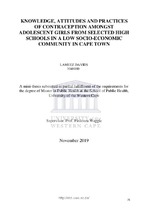Knowledge, attitudes and practices of contraception amongst adolescent girls from selected high schools in a low socio-economic community in Cape Town
Abstract
Adolescents account for 20% of the world’s population, and the majority of them are
inhabitants of developing countries. Increasing sexual activity amongst adolescents is a public
health concern because it can lead to teenage pregnancy which in turn leads to an increase in
relative poverty, unemployment, poorer educational achievements (for the adolescent) and
poor health of unborn children. Contraceptive use gives females the ability to make informed
decisions about their fertility as well as greatly reduce female morbidity and mortality. Despite
freely available contraception and accessible reproductive health policies and facilities, a
majority of adolescents still report unintended, unplanned pregnancies.
.

